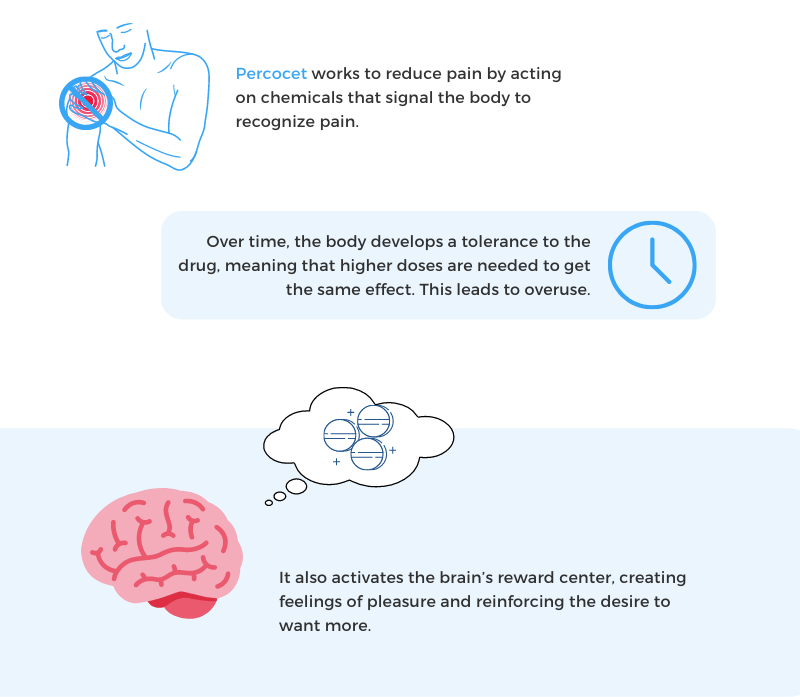Percocet is a commonly prescribed opiate that many people get addicted to. How long it takes someone to get addicted to Percocet depends on a variety of factors. The drug contains a chemical called oxycodone, which is prescribed to alleviate pain. However, it is highly addictive and people with substance use disorder take it recreationally, or without a prescription[1]. Due to the highly addictive nature of Percocet, many people inadvertently become addicted in as little as one week.
Understanding how an individual gets addicted to Percocet as well as how quickly an addiction develops is important in treating addiction. It is important to remain aware that while it is a prescription drug, use and subsequent abuse of the medication has many negative consequences.
Biology of Percocet Addiction

Once drug use is stopped, the body has to re-establish its natural balance. After abusing the drug, the body lacks the natural chemicals that alleviate pain. This chemical imbalance occurs with regular use of Percocet and results in physical dependence. Even if taken as prescribed, unpleasant withdrawal symptoms may occur once the medication is discontinued. Such symptoms include nausea, vomiting, diarrhea, and pain[1]. Depending on the individual and their patterns of drug use, it takes anywhere from one to four weeks of regular use to develop an addiction to Percocet.
People suffering from chronic pain are at an increased risk of developing a substance use disorder and abusing medications like Percocet. As they continue to take the medication, it stops working as effectively and they need to use more and more. Doctors often recommend stopping the medication, but the individual is typically addicted at this point. This drives addicted individuals to illegal means of acquiring the drug whether it is buying it off the street or stealing it from friends and family members. It is important for chronic pain patients to have a safe, long term pain management plan in place once discontinuing opioid use.
Consequences of Percocet Addiction
As Percocet is a prescribed and legal medication, people often have the false view that it is safer than other opiates. However, it acts in the same way as illegal opiates, such as heroin, making it deadly. Percocet abuse can lead to a long list of side effects. Some of these side effects include dizziness, fatigue, loss of appetite, constipation, anxiety, and depression[2]. These are all a result of the chemical changes wreaking havoc on the body.
Once someone is addicted to Percocet, riskier behaviors might develop. This means an addict will use larger amounts of the drug. Percocet increases the risk of choking and slows breathing. In some cases, breathing may cease entirely. Percocet abuse also increases the risk of overdose and death. In addition to containing oxycodone, the drug contains acetaminophen, an over-the-counter painkiller. Acetaminophen, when used in high doses, increases the risk of liver damage[1].
When an addict decides to stop using Percocet, they may experience opiate withdrawal. Opiate withdrawal symptoms include:
- Nausea
- Vomiting
- Diarrhea
- Pain
- irregular sleep patterns
It is important to taper off this medication and to be closely monitored by a physician during withdrawal to avoid serious complications.
Signs of Percocet Addiction
Spotting Percocet addiction is not always easy, but there are some signs to look for. Addicts typically display a number of abnormal behavior including mood swings, agitation, or restlessness [2]. They are often unwilling or unable to discontinue their drug use. They feel as though they need Percocet to “feel normal” and go to extreme lengths to get what they want. Furthermore, people often engage in “doctor shopping”, which is the act of going to multiple health care providers to obtain prescriptions to fuel their drug habit.
Drug addiction alienates people from those they love most. However, it is important for addicts to seek the help they need. Regardless of how long it takes to get addicted, Percocet addiction does not have to be the end.
“Their stories may share common elements, but every person who falls into the trap of alcoholism or drug abuse has his or her own unique experience. This is extremely important as we develop a treatment plan, which is designed to cater to each person’s situation.”
Getting Help for Percocet Addiction
Comprehensive Wellness Center located in sunny Palm Beach, Florida, is here to help. We offer a number of services to help addicts on their road to recovery including medication-assisted treatment. Working closely with clients, we develop treatment plans to meet each individual’s unique needs and guide them on their journey to sobriety. Contact us today if you are addicted to Percocet and want the help you deserve.











